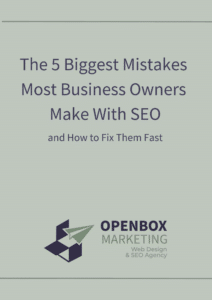Don't let SEO mistakes hinder your business's online success. Download our FREE guide today and unlock the strategies to optimise your visibility and avoid common pitfalls. Take charge and get your guide now!

Event marketing has become a widespread tool for businesses seeking to create a networking experience between companies or brands and potential and existing customers.
This article explores a few of the most relevant strategies for successful event marketing.
What is Event Marketing?

Event marketing consists of online and offline events promoting a company’s brand, products and services. It enables the hosting company to connect with its target audience and business partners in a welcoming setting.
The most relevant types of event marketing are B2C and B2B.
B2C marketing events involve directly promoting the event and getting people to register, attend, buy a ticket, and invite others to do the same. In general, this type of event marketing uses tools that convey positive emotions and personal benefits for participants.
In B2B, a company offers its event to other companies to convince their staff to participate. B2B shows how event marketing can help businesses sell more products and seeks to persuade these businesses to become sponsors of the event.
You can use both B2C and B2B event marketing to promote your business, and you should adjust the value proposition and tone of messages to the different specifications of each type of marketing event.
What are the 4 Cs of Event Marketing?
The 4C’s of successful event marketing help plan and implement events flawlessly by providing a structure that details every step from the initial design to the after-event assessment.
The 4C’s are:
1
Concept
This first phase of event marketing entails defining the objectives, theme, and vision and understanding the target audience and customers’ expectations.
The concept phase establishes the tone and determines elements like venue and decor. It must be thoroughly designed because it represents the base for developing other aspects of the event.
2
Coordination
This stage consists of the management of logistical issues and coordination with stakeholders to transpose the event into reality. Thorough coordination enables the accurate implementation of elements like venue preparation and guest welcoming.
3
Control
The control phase ensures the event runs smoothly by addressing unexpected challenges, supervising the plan’s implementation and managing available resources efficiently to deliver an incomparable experience for the participants.
4
Conclusion
This is the final stage of successful event marketing and involves the after-event activities that measure its success, from checking its results to collecting feedback from stakeholders and establishing areas of improvement for the company’s coming events.
What are Event Management Strategies?

Publishing blog posts before the event
Publishing blog posts before the event takes place enables you to provide more details regarding the why, who and how: why you organise the event, who is involved and how you came up with the idea to do it.
By sharing posts regularly before the event, you will get readers interested and increase the likelihood of more people attending your event. You can raise this interest by sharing links to the event through other marketing platforms.
Promoting the event on social media platforms
Promoting the event on your social media pages allows you to reach audiences outside your traditional target segment or regular geographical area and to spark the interest of persons who spend their time more on social than on traditional media channels.
You can use social media tools and analytics to measure the progress of your pre-and post-event marketing strategies.
Attracting influential people
Influential people can be a significant promotion tool if your brand is still to be known or if it needs a loyal audience. Depending upon the nature of your event, social and traditional media influencers, political figures, and famous persons can draw people who would not otherwise attend your event.
Selling lower-price tickets for early registration
This is a highly efficient event marketing tactic because it creates a sense of urgency due to its limited availability and generates conversions and cash for your event. It also makes people talk about it, increasing its reach and potentially attracting more attendees.
You can include a countdown for the availability of your lower-price tickets for early bird registration offers in your communication channels, like newsletters or press releases. By doing so, you get another opportunity to increase the number of participants at the event.
Promoting your event at other events
Events held by local communities, like festivals or fairs, allow you to promote your brand, products and services by displaying and sharing marketing materials such as prints, brochures, flyers or videos and meeting face-to-face with and connecting with potential customers.
What are the 7 Ps of Marketing in Event Management?

Like people, events come in different forms and sizes. They can be small gatherings or large multinational exhibitions. The 7 Ps of successful event marketing enable you to ask yourself the right questions to plan and implement the type of event you envision.
1
Purpose
The first thing you need to ask yourself is: what is your goal?
Additional questions that may help you are:
What do you want to do?
What is it you want to achieve? Brand development, leads, sales volume?
What type of event do you picture?
Do we have a theme for the event? What is it?
How many participants do we expect?
What is our target audience?
The answers to these questions will help you clarify the goal of your event and use it as a compass throughout the planning process.
2
Product
Your product or service is the reason for the event. Therefore, it must be clear for all people involved what the product or service is and how it will be presented at the event to have the best possible impact on attendees.
The demonstration and explanation provided during the event must be thoroughly prepared, so they deliver outstanding results. You can use different tactics and tools like launching the product and sharing promotional materials like brochures or flyers to share at the events.
3
Place
The place of the event is crucial as it can influence the number of attendees and its success.
Ask yourself:
Where will the event take place?
Is that location within the budget?
Can the place be reached easily? By public transportation or by car?
How long would it take attendees to get there?
What does the place include? Furniture, parking spaces, lighting, equipment, special services?
Is the capacity enough to host the expected number of participants?
If the event is online, ensure you don’t schedule it during holidays or other national or local events when potential participants can’t attend due to other engagements.
4
Promotion
Promotion is paramount as it ensures you reach a broader target audience and secure more attendees. You need to identify the best channels and tools for promoting your event by answering questions like:
What is the most efficient way to reach your target audience?
How can you invite people to the event in a memorable way?
Once you establish that, clarify other significant topics like:
- the central points of the promotion;
- the type of media (online or traditional) most frequented by your target audience;
- the social media channels that would ensure the most reach;
- how can people interested buy tickets – both online and in physical format?
After your promotion plan is ready, you can start implementing it by communicating it with a powerful and clear message on your website and social media page.
The promotion stage is successful if communicated to the right people at the right time with the right resources.
5
People
The success or failure of your event relies a great deal on the people who make it happen – both those “on the scene” (who interact directly with the participants) and those “behind the scene” (who deal with the logistics of the event).
To make sure you have the right team for the job, you need to know:
- what people you need in which roles;
- if you should appoint a single person or a team to plan and track the progress of the event;
- if the people appointed should remain in those positions permanently or just for a particular event;
- the skills and experience the staff involved in the event should have.
6
Partners
Partnering with other companies or people will help you reach their contacts and increase the chance of more people attending your event.
When looking for partners, you should focus on aspects like the probability of them sponsoring the event or providing material goods, their support in promoting the event and their responsibilities.
7
Performance
Once the event finishes, it’s time to evaluate its planning and results.
In this process, use questions like:
Did the event have the success you expected?
What were its weak and strong points?
What would you do differently the next time?
How did you overcome the challenges that occurred?
To measure your event’s performance, ask for feedback from participants and discuss the entire process with a team of follow-ups. These elements provide a complete view of your event flaws and performance, enabling you to do things better next time.
Successful event marketing helps your business increase brand awareness, reach a larger target audience, generate leads, and boost sales volume. In addition, it’s an effective way to get in touch with potential customers, work with valuable partners, and learn what improvements you need to implement for better performance at future events. Thorough planning, unitary execution, clear communication and consistent follow-up will ensure one successful event after the other for your business.
Share this Article

Janet Podham
Janet Podham is the owner of Openbox Marketing Limited. She has a post-graduate diploma from the University of Otago, majoring in Data Science. She has spent two years studying website design and SEO in the Champions Masters Program at the eBusiness Institute in Australia. She loves helping people and knits for local foster children in her spare time.






